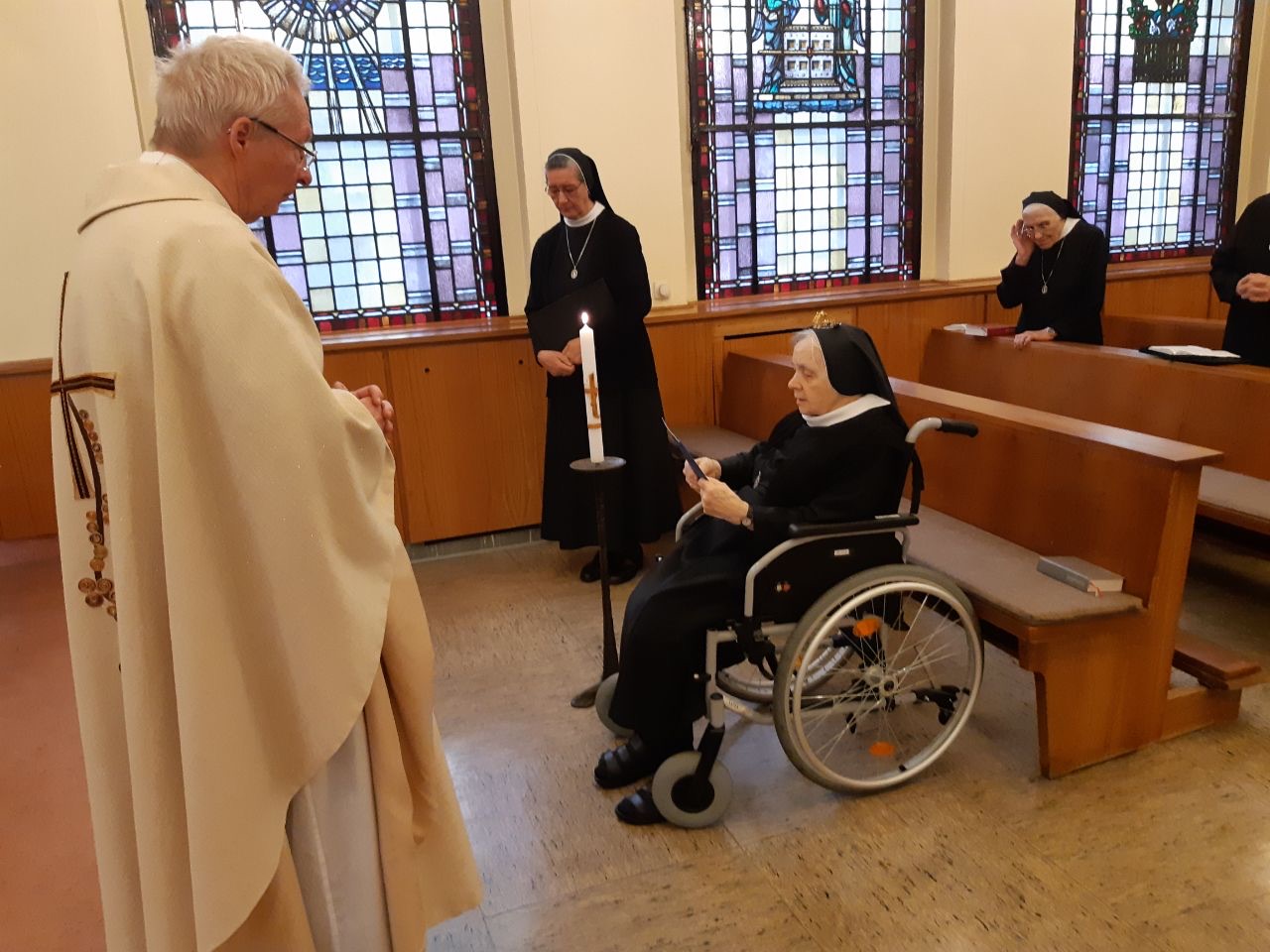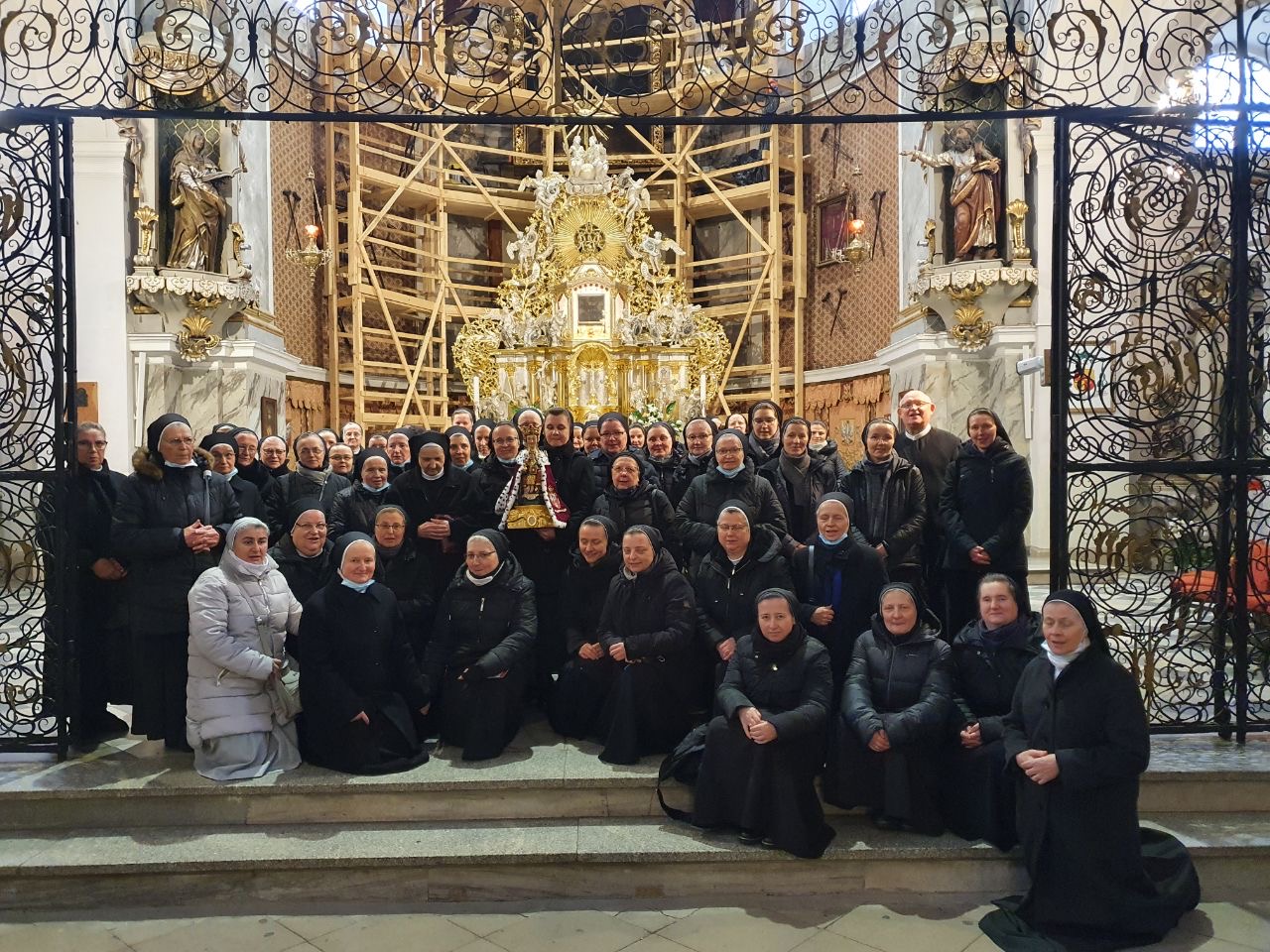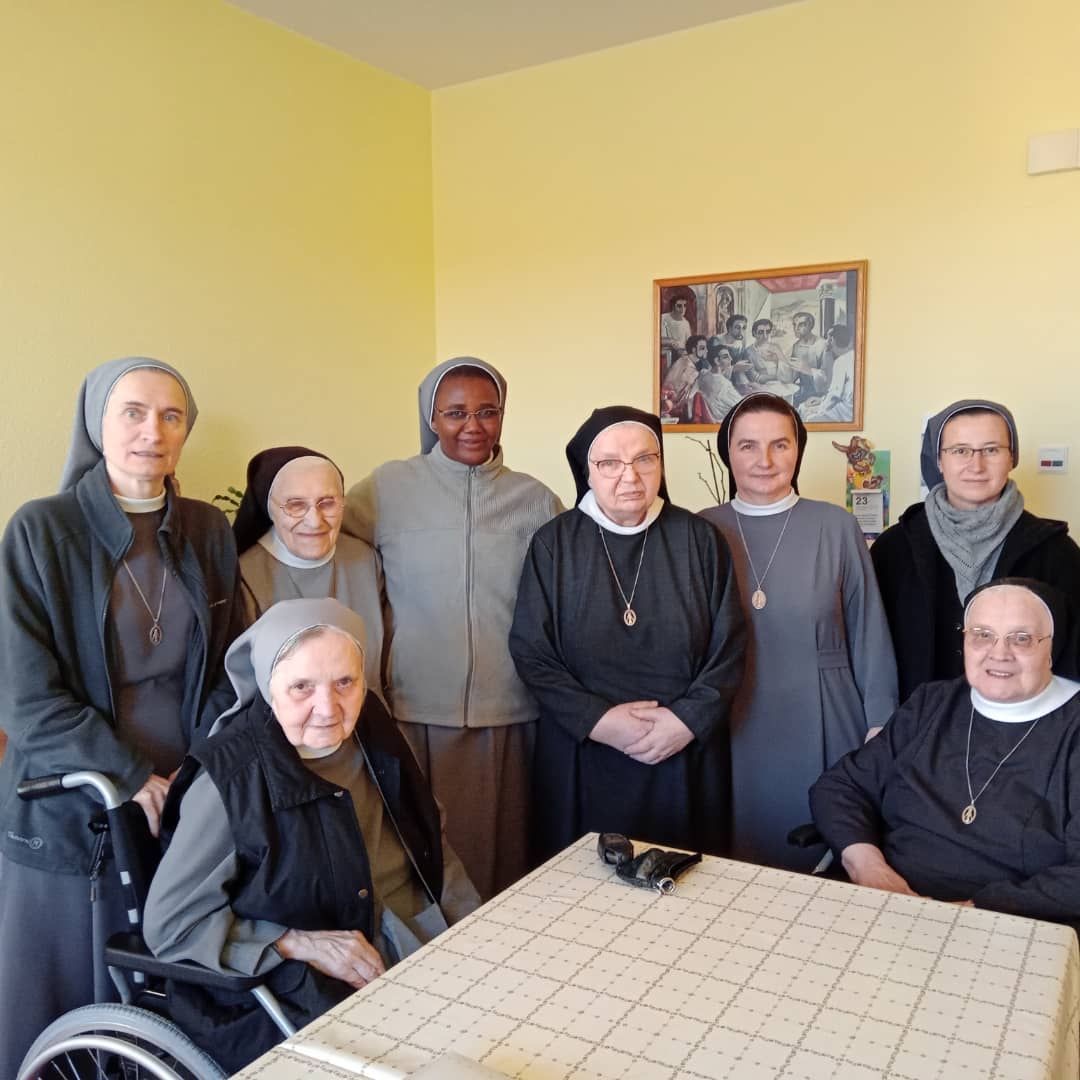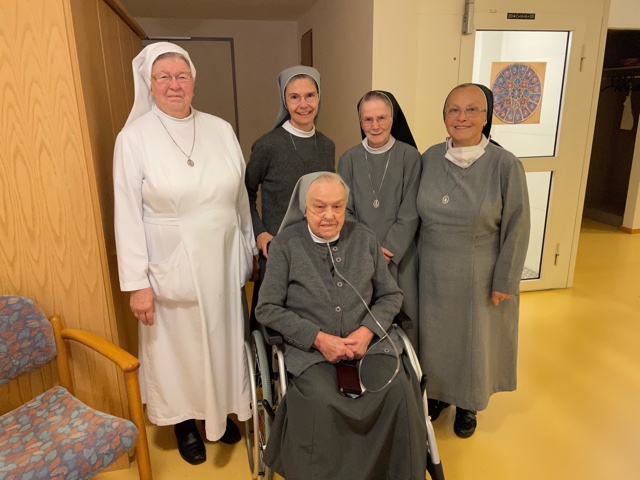
Nov 29, 2021 | NEWS
Praise the Supreme Lord forever.
This refrain of today’s responsorial psalm could be sung by the Servant of God, Father John Schneider, looking at how the work he started was developing.
After the appeal was printed in the Catholic press, Wołanie for help, several dozen families, who financially support the activities of the Association to help serving girls, applied to the foundation. The sale of shares issued by the Marian Foundation was also effective. This made it possible to rent more rooms in the tenement house belonging to the parish of Our Lady on the Sand, which was located at today’s Jumping Star Square. The desire of those involved in the work was to buy a house in Ostrów Tumski at the then Krupniczy Zaułek at number 10 (Gräupnergasse 10). At the request of the Elizabethan Sisters, at the beginning of the 20th century, Zaułek Krupniczy changed its name to ul. St. Joseph.
This desire became a reality in late 1858. On December 9, a shelter for girls was consecrated. Successively, the Foundation bought neighboring plots of land, and as a result, a support center for girls and women in difficult life situations was established in one place. During the life of the Servant of God, over 60,000 girls found support here for a good start in adult life. The Marian Foundation created a household school with a boarding school for them, the foundation’s employees were looking for jobs for graduates of the school, temporarily unemployed girls and women could live in the shelter, the sick could stay for treatment and convalescence, and elderly women found a seniors’ house where they stayed until death.
Father John Schneider and the members of the Board employed teachers, tutors and nurses. The female employees performed their duties very well, but returned to their families after working hours. Teenage girls who left their family homes due to poverty still needed the warmth of a home. According to our Founder, such a family atmosphere could be created by nuns as spiritual mothers for the girls under their care. He was looking for a religious congregation in Wrocław that would undertake such a service. Unfortunately, each had its own creations.
It was then that he drew attention to the teachers employed by the Marian Foundation who had not yet started their own families. Four of them offered to devote themselves to poor girls standing on the chasm of moral evil. Father John Schneider explained to them the meaning of a life devoted to God and people through weekly spiritual conferences. After such a three-year formation, the Sisters Agnes, Matilda, Jadwiga and Rosina, on May 26, 1863, at the oratory of the Foundation House, made private vows to the Servant of God and received from him uniform robes: blue dresses and white bonnets. This outfit was supposed to remind them of the person of Our Lady, but at the same time it was very similar to the outfit of Protestant deaconesses. At the request of the bishop ordinary, the sisters changed the color of their habits to black and assumed black veils. The most talented of the first sisters was Sister Agnes and Founder saw her as the future superior of the new religious community. Unfortunately, after a year, and on Father John’s name day, she left the Foundation. God sent new vocations and each year several girls joined the nascent religious community of the Sisters of Mary Immaculate.
We learn about the spiritual profile of our spiritual daughters from the notes of Sister Matilda, which she noted on May 26, 1863. Father Founder said this:
You came from far away. You left the quiet family home, the world of childhood and all that belonged to your fatherhood and joined the poor Foundation of the Blessed Virgin Mary. It is really poor according to the concepts of the world. For poverty founded this foundation and built it at the cost of the sweat and labor of the poor. Poverty lives here. You have found out about it during your long candidacy.
What can you count on in this connection? If you are looking for a comfortable and pleasant life, know that the Sister of the Blessed Virgin Mary is not resting on the roses. Strenuous work awaits you. You are to be the handmaids of the servants.
Where poverty comes to the table, comfort does not feel right there. Moreover, you even have the duty to go and ask good people for the poor whom you feed and take in for what they need. The world has enough funds to build theaters, but it cannot offer itself sacrifices to alleviate the poor and save those who live in poverty.
Or maybe you want respect in this world? And you have to give up on that too! Certainly, there will be also those who will ridicule your plans and call you stupid for devoting your life to such classes. You will be unknown. People will insult you. What I can offer you in this world is nothing more than this poor robe and a quiet tomb, known and visited only by a few souls. But a Christian does not work for the world, because he climbs for higher purposes. His award smiles at him from the other side.
Remember that by placing yourselves at the service of poverty, you are placing yourselves at the service of the Divine Bridegroom, who has left us his representatives in the poor and the little ones. After all, he tells us about the sacrifices we make for the love of the poor and the abandoned: “I was hungry and you fed me, I was thirsty and you gave me drink, I was a guest, and you welcomed me, and what you did to my brother, you did to me. “(J. Schweter, History of the Congregation of the Sisters of Mary Immaculate, Wrocław 2000 rt1.
The Kulturkampf period was the test of fire for my Congregation at the very beginning of its existence. All the sisters went on a week-long pilgrimage to the Marian Sanctuary in Filipów (today it is located in the Czech Republic near the border triangle of Poland, Czech Republic and Germany) to plead for the miracle of saving the Congregation from liquidation. And the Mother of God saved her Marian Sisters.
What is my trust in the Mother of God in times of trial of faith?
Sr.M. Elżbieta Cińcio

Nov 28, 2021 | NEWS
On November 26, Sister Rosa celebrated her 60th religious anniversary in Berlin Kreuzberg. Due to pandemic restrictions, there weren’t many guests, but the ceremony itself was very deep and solemn.
Sr. Rosa spent most of her religious life serving the deaf and organizing pastoral care for them. This activity was interrupted by coronavirus; therefore Sr. Rosa’s greatest jubilee wishes, is to return to meeting people who need her as soon as possible.
Sr. Rosa herself recalls her work as follows:
“In early1988, deaf people began to officially come to our chapel and the Hall, where they could pray and meet people who understand them. Initially, only Sister Christiana, who was also deaf, was offered such a service from the president of the deaf in our diocese. Two years later, in 1990, I joined Sr. Christiana and her community of deaf people. At first, I didn’t understand them, I didn’t know sign language, I had to learn it from scratch. However, I noticed during this work that it is not the knowledge of the language that is the most important here, but the heart and willingness to understand their situation. We understood each other well on this level. Maybe because I am not deaf, but I am also disabled. I lost my leg when I was a child and have been using a prosthesis ever since. I think this experience helps me better understand the problems of others. Despite the fact that they have their own families and their lives, they feel lonely and somewhat excluded from the normal world. Even before the pandemic, we organized a Holy Mass once a month. In sign language, and after the Mass there was a meeting for coffee and common conversations. Everyone came to these meetings very willingly, because they felt completely accepted and understood here. Also, outside of the Mass. We kept in touch with each other. They came to me whenever they needed help, when I had to call somewhere, or when they did not understand something, e.g., on official matters. I was happy to help them and dealt with their various affairs with them. Now, for the second year, I have not been able to meet them. In our home, where I live, there is an old people’s home, where there are two of my pupils. I meet them regularly. We talk, pray and play together. I also have health problems recently, but I still hope that I will be able to serve my people”.
SMI

Nov 28, 2021 | NEWS
On Sunday, November 21, another pilgrimage of the Sisters of Mary Immaculate took place to Our Lady, the Keeper of Faith in Bardo.
The tradition of this pilgrimage goes back to the beginnings of the Congregation. At a time when a young, small community began to form, a government decree to liquidate orders (Kulturkampf) was issued. The sisters realized that this was a hopeless situation, so they made the effort to make a pilgrimage to Our Lady to ask for a miracle of salvation. After several days of intense prayer, they returned to the monastery and at the same time received a state decision that they could stay in the monastery and not be secularized. After this event, the sisters made a promise that each year they would go on pilgrimage to the throne of Mary to give thanks for saving the Congregation. It is now an opportunity for us to thank for all the favors the Congregation has received in its history and for the favors that each sister receives.
Despite the still developing pandemic, the sisters came in large numbers to the Sanctuary of Mary, Keeper of the Faith in Bardo. During the solemn Mass and in praying the rosary they thanked for the protection of Mary and asked for strong faith for the future. Sanitary restrictions did not allow kissing the statue of the Mother of God, but the Priest presented it in front of the altar so that we could worship before Mary through prayer and gestures of respect. After a long time, we could be together again and Mary was among us and with us.
SMI

Nov 26, 2021 | NEWS
I would like to share my travel experience during epidemic season!
After this huge crisis of Covid-19 each and everything has been affected in the world; socially, economically and in religion has totally changed in terms of worshiping God. So in the middle of this hard time, I got a chance to travel to Europe for Congregation matters and also holiday. Un expectedly I travelled in three countries simultaneously due to the problem of my Visa for Italy which delayed due to the new travelling system.
I started my journey from Tanzania on 15th October 2021 and first, I arrived in Poland, then Berlin and lastly in Rome/Italy.
I can admit that, language, unity and love are the values which contributed to good communication with the Sisters I met in Europe, it was very fun and interesting, I did not know the Polish even German language but when I was there; I didn’t feel the countries difference, it was like; I was in Tanzania. I communicated with the Sisters through gestures especially when there was no one near to translate and we understood well each other and both were so happy.
The Sisters were so interested to ask me many different questions concerning our Region and the life in general in Tanzania. I tried to answer and explaining all things they were interested to know about our Congregation life in our Region and they were so happy. One thing was so amazing for me is that; For example I used to communicate with Sister Luka in German by using Google translate in my phone to pass my gratitude message to the Sisters, then after sending the message was read and the feedback was good. In general, I enjoyed my time in Europe by learning many things from my fellow sisters in Poland, German and Rome.
For me I can say that; every day is a day of learning and growing. Love and unity goes together and have a lot of power because through them we are always connected together regardless of our traditions, language and color.
Sr. M. Agnes Mwanajimba
Region – Tanzania

Nov 25, 2021 | SPIRITUALITY
Memories of German history
Do you remember? The occupations of the German embassies in Prague and Warsaw in 1989, the opening of the border between Austria and Hungary, the Monday demonstrations in Leipzig and other places, the first opening of the Wall on November 9, 1989 and finally the Day of German Unity on October 3, 1990. Back then, they were eventful and eventful weeks that we all experienced with excitement. And many feelings accompanied us: worry and great fear, but also hope and joy. And when the unification treaty was finally signed, quite a few also folded their hands and thanked God. German unity was not just the work of people, it was also felt as a gift, a gift from above, from God.
There are two extreme positions that could be associated with this topic of “gift unity”, and which I would like to briefly suggest here.
Put your hands in your lap
On the one hand, one might think: if unity is a gift, then I cannot and do not need to do anything. Then I can put my hands in my lap and wait for unity to come from God. I would like to warn against this assumption. I am sure that German unity would never have come about without the efforts of many on both sides: politicians, scientists, representatives of the churches, artists and many ordinary citizens.
Furthermore, I am not only thinking of German unity. Christians are also divided into different denominations. And I am grateful and happy that many Christians do not put their hands in their laps and wait for God to make a difference, but rather that they cooperate and approach one another, even if they know that unity is ultimately a gift.
Ordered or forced unity
Unity cannot be made, let alone order. This is shown by the recent history of several European countries. The Soviet Union quickly fell apart during the time of glasnost and peristroika. In the former Yugoslavia, the 7 republics immediately declared their independence after Tito’s death. And even in countries like Great Britain or Spain, unity is sometimes at stake. A prescribed or even enforced unit seldom lasts.
So reality lies in the middle. Unity is a gift, but I can do a lot to ensure that this gift can become and remain a reality.
Appreciation as a breeding ground for unity
Unity needs another breeding ground for it to grow. This breeding ground is mutual respect. There are wonderful examples of this as well. Pope Paul VI met the Patriarch Athenagoras in 1964 and thus took an important step towards bringing the Orthodox and Catholic Churches closer together. And with his visit to Warsaw in 1970, Willy Brand certainly also set a milestone on the way to German unity. Of course, you cannot do the unity with such activities. With certainty, however, one can create the conditions on which the unity can then grow. Receiving gifts and doing something for them are not mutually exclusive.
Resignation and accommodating
The mutual appreciation that I show for the other is certainly a great gift that contributes a lot to unity. But there are other gifts that don’t have much to do with giving at first.
Even as a child I learned that I had to forego some things in the family and make compromises. I experienced that with my parents, then with my siblings and also with me. In the beginning, this waiver was certainly not voluntary, but rather forced. But later I was able to experience that this kindness and renunciation also contributed to the fact that we grew together as a family and that we are still in good contact with one another today.
Compromise and renunciation as our parishes grow together are of very topical importance. Here, a waiver is often necessary, e.g. when choosing a church as a parish church or when redistributing financial resources. If there is only anxiety that I don’t miss out, unity can never grow. Only when the common whole becomes more important to me than my own interests can a parish arise.
Gratitude: maintaining unity
You put a bouquet of flowers in the water to keep the flowers fresh for a long time. I go out carefully with a given bike so that I can ride it for a long time. Gifts want to be cared for. This is certainly the most beautiful way of appreciating gifts and thanking the giver of the gifts. That applies to the German unity that was given to us 30 years ago. This also applies to the unity of Christians, which we continue to strive for. And that certainly also applies to the unity in a convent, a religious community, a presbytery, a congregation.
Prelate Dr. Stefan Dybowski
7th, October 2021 monthly lecture St. Augustinus Monastery, Berlin-Lankwitz





